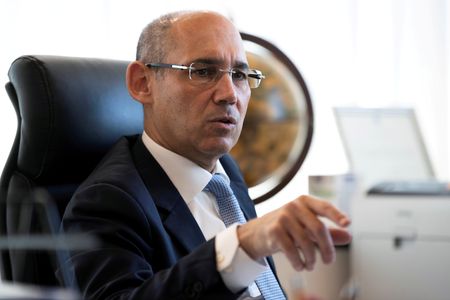 1
1 1
1
By Steven Scheer and Ari Rabinovitch
JERUSALEM (Reuters) -Israel’s monetary policy is currently restrictive and at an appropriate level given moderating inflation, but interest rates could rise further should the shekel’s depreciation continue, Bank of Israel Governor Amir Yaron said on Tuesday.
Yaron said since the last interest rate decision on May 22, the shekel, which has been under pressure since the start of the year over the government’s judicial reform plans that triggered mass protests, has further depreciated 2-3%.
“Should this trend continue, an even more restrictive monetary policy may be required,” he said.
Inflation, Yaron added, was at least one percentage point higher than it should be due to a 10% depreciation versus the dollar since January.
Inflation will likely remain at around a 5% rate in May but is expected to move back within a 1-3% target in the first quarter of 2024, he said.
Yaron, speaking at an Israel Democracy Institute conference, said should the government push forward with its judicial plan, it should be done with a broad consensus and maintain the independence of institutions.
The Bank of Israel has raised its benchmark interest rate to 4.75% from 0.1% in April 2022, leading to a sharp rise in mortgage repayments while banks reaped large profits and expanded dividend payouts, stoking anger among the public.
Israeli Finance Minister Bezalel Smotrich told the conference it was “logical” to tax banks’ excess profits as a result of steep rises in interest rates.
Smotrich, whose speech was continuously interrupted by protesters of the judicial plan, said such a tax “is the best way to correct the distortion created by the interest rate differentials and make it easier for the mortgage-taking public, without harmful legislative intervention.”
The Tel Aviv banking index dropped 2.5% following Smotrich’s comments.
Yaron said banks need to pass on higher rates to customers’ deposit accounts and not only to loans. If not, he warned the central bank “will not hesitate to act with the regulatory tools at our disposal”.
Israel’s economy is “complex”, Yaron said, citing high economic activity and a tight labour market but declining consumer spending as a result of the interest rate increases.
Yaron cautioned that the judicial plan could harm the economy over the long term, quoting a report that said at least half of local startups founded this year would not incorporate in Israel.
He also pointed to local markets underperforming global indexes and an increase in Israel’s risk premium.
Last week, parliament approved the 2023-2024 state budget, which Yaron said was responsible in that it was not excessively expansive but lacked “growth generators essential to the economy, and in some places there is even a negative contribution.”
His comments come as the country’s economy is projected to slow to a growth of 2.5% this year from 6.5% in 2022.
(Reporting by Steven Scheer and Ari Rabinovitch; Editing by Sriraj Kalluvila)